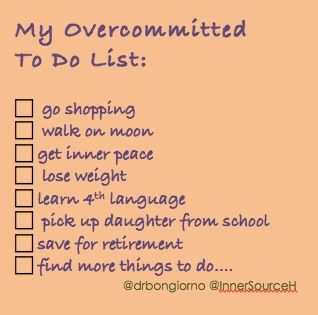
Stress
Are You Overcommitted?
Doing too much may change your brain and damage your body, but there's help.
Posted July 30, 2016

Boy, there is a lot to do…
…there’s your job of course. Work is at least 35 to 50 hours a week. Then, you still want to take the time to go shopping, get the laundry done, cook a meal every once in a while, and get together with friends. Oh wait, you need to fit in exercise somewhere. And, uh-oh, you almost forgot to pay that credit card bill. Then, you really should visit those relatives you haven’t seen…… whew, that is a more than 24 -7 life already.
Maybe you have a hobby from youth you try to get to when you can, just for fun? And, holy cow - you have a kid? Here’s another full 24-7 job to add: chauffeuring to and from school, there’s birthday parties to go to, guitar lessons, getting breakfast and lunch together… play dates, baseball games, school assembly, graduations to plan.
And, then, there’s some needed one on one quality time with your partner. And you want to sleep too?
We Are An Overcommitted Bunch
We in the ‘civilized’ Western world have way more to do than is doable. Does the term “overcommitted” fit you? Likely it does. You probably don’t have time to read this, but I am glad you are.
Think about this: even more dangerous to our health is the fact overcommiters tend to look around and think we actually aren’t doing enough! I know for myself, living and working in New York City ( a city of self-proclaimed over doers and overcommiters), it is easy to look around at everyone else and think how you are really doing enough to keep up.
Defining and Studying Overcommitment
According to a German study (1), the term ‘overcommitted’ refers to people who are doing way too much. And more specifically, we (yes, I am admitting it - I am one) also have a high need for approval for the things that we do.
We are talking about a type A behavior personality where a person has a lot of ambition, likes to control things, and needs approval too.
People who are overcommitted generally try to do much more than is humanly possible, and they use up their all energy in the process, to the point that they can get sick to the point of exhaustion and poor health. In some natural medicine circles, this will lead to what is called‘adrenal fatigue’, a condition where the adrenal system is working sub optimally.
Why Overcommitment Is Not Good For You
Overcommitment has been shown to lead to a number of issues including:
- depression
- diabetes
- sleep problems
- inflammatory disease (like autoimmune illness) and
- cardiovascular disease.
When you are temporarily overcommitted, and in an anxious state, your body tries to help you cope, by making many more stress hormones and also chemicals that can raise inflammation in your body. In the short term, these will help you muster the energy to cope with the stressor and get through. It is like when you are running from a bear, you want those stress hormones to kick up your speed and make you stronger. And you want those inflammation molecules just in case there is a fight, so you can fight the infection from any injury that might happen.
Unfortunately, overcommitted people run hot like this all the time. They are always running from the “bear.” In the long term, these stress hormones and inflammatory chemicals tend to start doing more damage than good: they beat up the brain, the linings of the blood vessels. They deposit fat in places they shouldn’t and there's often poor blood sugar control. This is why so many diseases become more likely when we are overcommitted.

When you are chronically running from a bear, you will notice your resilience to stress starts to buckle too. Your sleep can be affected, and for women, hormonal issues start cropping up, including difficult periods with pain and emotional challenges, fertility issues and sufferable menopause symptoms too. For men, libido and sexual performance will go way down, fatigue takes over, and anxiety and depression can hit as well. For those genetically prone, they may end up with allergies, headaches, migraines, chronic fatigue, digestive problems, high blood pressure, or the opposite postural hypotension (a condition where blood pressure drops easily).
The German study from 2008 looked at 53 teachers (20 men and 22 women). Teachers are a group notoriously known to overcommit despite the fact that they are given little appreciation. They tested each person to find out who were over-committers, and who were not. What they found was the people who were demonstrated to be overcommitted in their lives had a tough time creating the stress response needed to keep up with the demands of life. Like in the case of adrenal fatigue, these people were running from the bear for so long, they couldn’t even make the hormones they needed to keep it up.
This makes these teachers and all of us over committers especially vulnerable to the burnout we talked about.
How To Protect Yourself and Heal from Overcommitment
In my New York City practice, I see this overcommitment syndrome as a very common underlying cause of illness. While I understand most people can’t just completely stop their lives, I do recommend a few ways to rethink and support their mind and bodies:
1 – Sleep a little more: sleep is the best way to rejuvenate the body and the stress system. Trying to get to bed early (by 10 or 11 PM) goes a long way to lower inflammation and heal. I recommend not even attempting exercise if you are not getting enough sleep, for you may deplete yourself more.
2 – Remember that ‘no’ is a sentence: it is O.K. to say no sometimes. Realize you do not have to go to every friend or family event, or kid’s birthday party. Really, you don’t. You also don’t have to be the volunteer for that church or community project, because you feel guilty. You may not need to check all those emails or answer every facebook comment at night. You can also opt out of extra work – it won’t kill your career. It is O.K. to let someone else do it and delegate when you can.
3 – Meditation: even one minute twice a day will help shift your body from “I’m running from a bear” stress mode to “I can be in the present” mode. This will open up your digestive tract and lower inflammation in the body, as well as allow your brain to repair from all the stress hormones. Overcommiters live in the future – visiting the present can help break the cycle.
4 – The Mediterranean Diet: this diet is full of vegetables, fruit, fish, healthy oils, beans, whole grains. nuts and seeds. This diet feeds a depleted body well, and keeps inflammation at bay while serving up the molecules that help the brain and the body repair itself. Being well-nourished will increase your resilience.
5 – Take some vitamins: my favorite vitamins for general health and mood, as supported by research, are a good quality multiple (2), a fish oil (3) and a probiotic (4). These can help gently support systems that are constantly under siege.
6 – Find places for support: look towards friends, family, and other overcommiters to share the burden. Maybe you and another class mom can switch off taking your child to gymnastics, so you can spend a little time meditating, watching some Oprah, and eating kale chips (a Bon Bon every once in a while can be fun too ).
7 – Prioritize: going along with #2, know that you can’t do everything… so sit down in a quiet place and pick what is most important and make that the focus.
8 – Adrenal Testing and Support: There’s a test called an saliva adrenal test or saliva stress test, and it can show function of your adrenal system. I discuss this test in the appendix of my book on anxiety. Once you have the information from this test, you can pick the right herbs and supplements as well as lifestyle choices to boost your adrenals. For some people, an adrenal supportive supplement can help gently nourish the adrenal glands when they are not responding as well as possible. I have seen correlations between non-optimal adrenal function (aka “adrenal fatigue”) associated with orthostatic hypotension, POTS Syndrome (postural orthostatic tachycardia), chronic fatigue and fibromyalgia, as well as inflammatory issues like lupus and other autoimmune diseases. Remember, vitamins themselves do not fix the problem, but they may help support the body to avoid exhaustion. And when used with a proper regimen of sleep, lifestyle and dietary changes like mentioned above, you can gain your strength and vitality back. For adrenal help, I like to use a combination that includes ashwanganda, B vitamins and mushrooms. There are many quality supplements out there for this purpose. In my clinic, we use Adrenassist. Talk to your holistic doctor to learn which might be best for you.
About the author: Way overcommitted himself, Peter Bongiorno, ND, LAc. is President of the New York Association of Naturopathic Physicians. Dr. Bongiorno trained at Bastyr University, and researched at Yale and the National Institutes of Health before medical school. In 2010, Dr. Bongiorno authored Healing Depression: Integrated Naturopathic and Conventional Treatments, the first comprehensive textbook designed to teach physicians how to use the science and art of natural medicine to heal depression. His book for the public, How Come They’re Happy and I’m Not? The Complete Natural Guide to Healing Depression for Good (Red Wheel) followed.
In 2015, he authored the professional text Holistic Therapies for Anxiety and Depression (WW Norton). His newest book for the public is, Put Anxiety Behind You: The Complete Drug-Free Program.
Visit drpeterbongiorno.com, InnerSourceHealth.com and join him on twitter @drbongiorno for updates on naturopathic mental health.
References:
3. Kuan-Pin Su et al. Omega-3 Polyunsaturated Fatty Acids in Prevention of Mood and Anxiety Disorders. Clin Psychopharmacol Neurosci. 2015 Aug 31;13(2):129-37.



